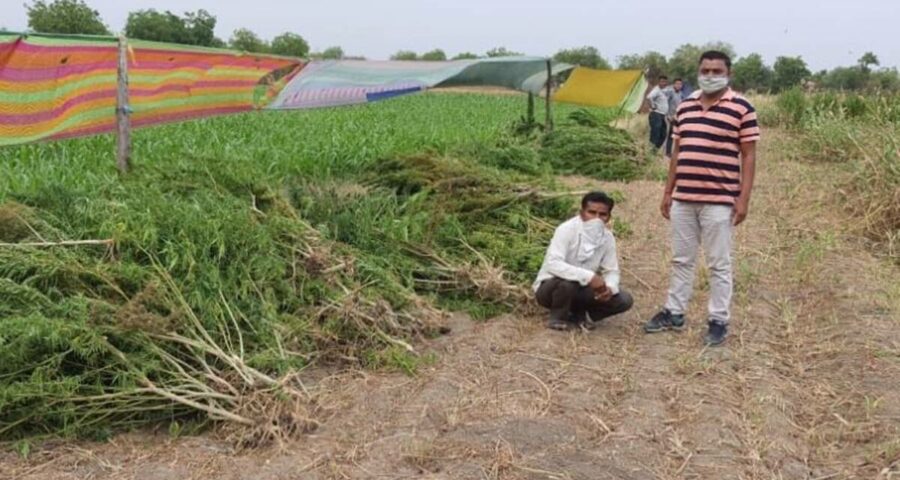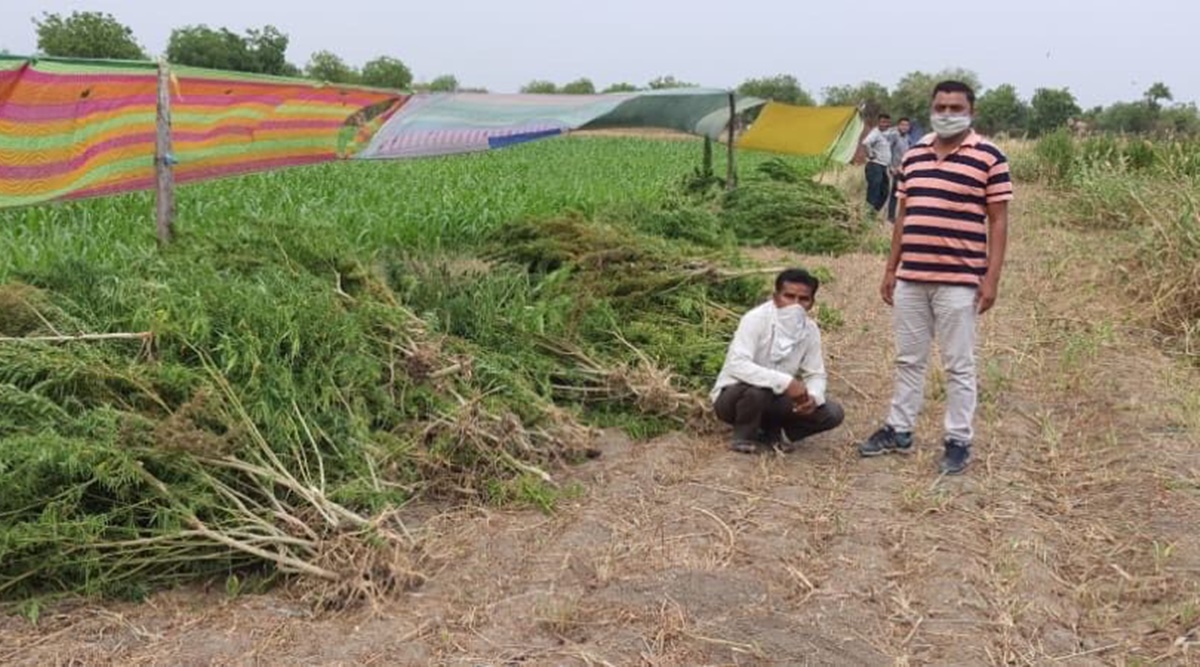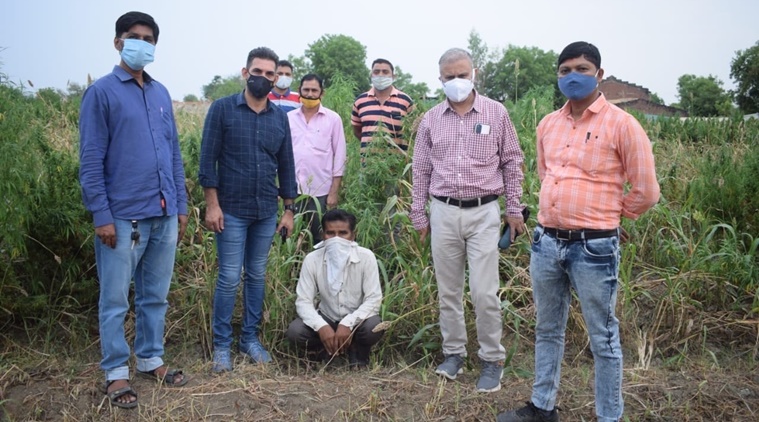Cases compiled by The Indian Express show that since June, local police and NCB have seized narcotics worth above Rs 6.6 crore in 21 instances and arrested over 52 persons for drug trafficking via rail, road and air from different parts of the state.
Last month, the mother of a 24-year old Rajkot-based cricketer had accused six persons of luring her son and his wife into substance abuse. Following her lead, the police had found Akash Ambasana, a former under-19 cricketer, and wife Ami Cholera (22), under the influence of mephedrone at a hotel located barely 200 m from the police commissioner’s office. The couple, now at a rehab, “were saved due to timely intervention of the mother”, said police officials privy to the investigation.
This comes barely a month after, the Directorate of Revenue Intelligence (DRI), on September 16, found two cargo containers with over 2,988 kg of heroin worth Rs 21,000 crore, smuggled as “semi-processed talc stones” at the Mundra Port in Kutch. It was claimed to be the biggest seizure of narcotics in the country.
At the centre of the case, now with the National Investigation Agency (NIA), is a Chennai-based couple — Machavaram Sudhakar and his wife Govindaraju Durga Purna Vaisali — and Rajkumar P from Coimbatore. Besides, six Afghan nationals and an Uzbek were also arrested from different parts of the country.
Investigative agencies believe that the 1,650-km-long Gujarat coastline, which was always used as a ‘gateway’ for international drug networks to smuggle large consignments from the ‘golden crescent’ (the land-locked area between Iran, Pakistan and Afghanistan considered to be the global hub of opium production) to countries in Europe and other continents, has now turned into a destination.
The National Crime Records Bureau (NCRB) in its Crime in India 2020 Report states that as many as 308 cases under the Narcotics Drugs and Psychotropic Substances (NDPS) Act were lodged in Gujarat in the pandemic year, of which 117 were those of personal consumption, a number that has been steadily rising. In 2019 of the 289 cases under NDPS Act, 112 were of personal possession, a sharp rise from 2018 when of the total 150 cases under the act, 60 were those of personal use.
Cases are aplenty. Days after the Navratri festival, a 33-year-old man (name withheld) was at a private rehab centre in Ahmedabad for the third time this year for help against brown sugar addiction. His last two stays at the centre ended abruptly due to a “relapse”.
Counsellors treating him believe that while his family is affectionate and caring, it was them who provided him with the narcotics after they saw him “suffering from withdrawal symptoms” during the recovery period. At times, the narcotics were hidden in the home-cooked food they parcelled to him at the rehab centre, much to the dismay of the counsellors.
Another 30-year-old man from Jamalpur in Ahmedabad is addicted to cheap ganja that he can “score” from nearby paan shops for a mere Rs 50. What started as a thrill in his early teens, became a daily routine for the next decade of his life, he says. Now, he has a bed reserved at the Naya Jeevan De-addiction Centre with 14 other addicts.
Dr Alpa Vyas, a counsellor at the Naya Jeevan De-addiction Centre, says that over 250 addicts have already visited the centre in the past year. Many leave abruptly, some complete the 30 days’ rehab period, while some keep returning to the centre, after each relapse.
“We don’t take addicts below the age of 18 years. The average age of addicts at our centre is 25-35 years. All of them had started using when they were young and did not seek help then. They only did after spending a considerable time of their lives ‘on a high’,” said Vyas.
Often, kids begin from beer to gradually move to hard drinks to marijuana to other chemical drugs in the trajectory as the dependency level in their body rises, says Ahmedabad-based psychiatrist Dr Rajendra Anand. “On an average, I see a new patient of addiction every day in Ahmedabad and Gandhinagar,” he says.
Narcotics Control Bureau (NCB) zonal director Shailendra Mishra says no person stays an addict forever. “At some point, they realise that they have been high for too long. But in that process, they end up wasting 10 or 15 years of their lives which could have been their golden time to become something,” he adds.
A sudden spike in drug smuggling cases was seen in Gujarat after the second wave of Covid-19. Cases compiled by The Indian Express show that since June, local police and NCB have seized narcotics worth above Rs 6.6 crore in 21 instances and arrested over 52 persons for drug trafficking via rail, road and air from different parts of the state.
According to psychiatrist Dr Anand, dealing with a drug addict is a tiresome and frustrating experience for the family as well. “When they see the addict relapsing after initial stages of staying clean, they lose all hope. However, the truth is that relapse is a natural reaction and part of the multi-dimensional approach of the rehab process.”
NCB’s Mishra says most parents are scared to approach rehab centres fearing their children will face trouble from the police. “But we never go to a rehab centre and ask them where did they get the drugs from. Consumers are victims of the drug menace and we always recommend help for them. Counselling is always better than punitive action,” says Mishra.
Police say that for cheap intoxicants such as ganja and bhang, cannabis and hemp plantations are grown by local “farmers” in Gujarat. In May, the Anand police busted a massive marijuana plantation and seized over 900 kg of plants sown among jowar crops.
In 2019, an 80-year-old farmer was caught in Amreli for planting hemp on his farmland. It took police two days to uproot the plantation and seize 1,766 kgs of hemp. As per investigative agencies, the locally-grown ganja, often distributed for free in social events, is extremely popular in Gujarat villages.
However, when it comes to sourcing “hard chemical drugs”, a close-knit network of peddlers and users and the use of the deep web are preferred.
In September 2020, the Ahmedabad police had a major breakthrough when it arrested Afaq Ahmad alias Afaq Bawa, a Mumbai resident, who was running an MDMA racket from the Maharashtra capital to Ahmedabad. According to police, Bawa used a network of local peddlers from old city Ahmedabad and an Assistant Sub-Inspector of police (ASI) to smuggle drugs to Gujarat via road.
“For charas (hashish) and heroin, heavy transport vehicles have been used from Jammu and Kashmir and Punjab to bring it to Gujarat. However, when it comes to mephedrone or methamphetamine, MDMA or LSD, the use of the deep web by youth is also getting popular. Often drug consignments are concealed in courier packages that are ordered online on advance payment. Roadways smuggling from Mumbai is an old modus operandi now,” said a senior police official in Ahmedabad.
Recently, Minister of State (MoS) for Home Harsh Sanghavi announced a first-of-its-kind “narco reward” policy under which the informants and police personnel working to crack down on smuggling and sale/purchase of narcotics would be rewarded monetarily. The Gujarat Police have also announced a helpline — 1908 — wherein citizens can report on smuggling, sale/purchase and consumption of drugs.
However, experts urge a sympathetic approach to deal with young drug users. “Teenage is a period of turmoil where children face a lot of stress due to academic expectations. There is no one to listen to what they want and in these circumstances, drugs become an easy recluse. We need to tell our children that we don’t hate them but we hate this particular bad habit,” said Dr Shraddha Rai, chairperson, Rehab Council of India for Gujarat, Rajasthan and Daman and Diu.
Source: Read Full Article



